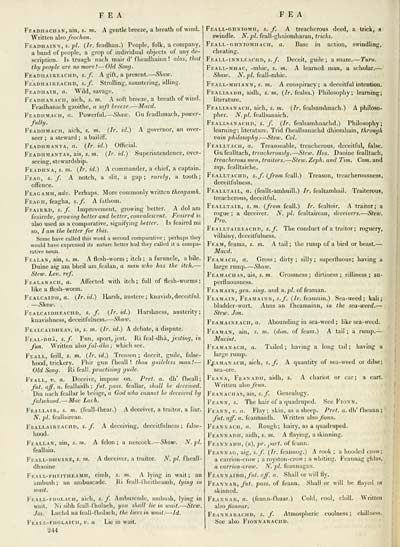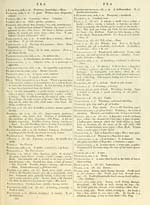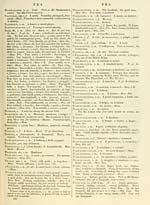Download files
Complete book:
Individual page:
Thumbnail gallery: Grid view | List view

F E A
F E A
Fp ADiiAcn.vN, ain, s. m. A gentle breeze, a breath of wind.
Written ahofeochayi.
FiADiiAiNv, s. p/. (/r. feadhan.) People, folk, a company,
a band of people, a grop of indindual objects of any de-
scription. Is truagh nach mair d' f lieadhainn ! alas, that
thy people are no more! — Old Song.
Feadhaireachp, s.f. A gift, a present. — Shaw.
Feadhaikeacud, s.f. Strolling, -sauntering, idling.
Feadiiair, a. Wild, savage.
Feadiianacii, aich, s. vi. .\ soft breeze, a breath of wind.
Feadhanach gaoithe, a soft breeze. — Macd.
Feadhmacu, «. Powerful. — Shaw. Gu feadlimach, power-
fuUy.
Feadhmacu, aich, s. to. (It. id.) A governor, an over-
seer ; a steward ; a bailiff".
Feadhmanta, a. {It. id.) Official.
Feadiimantas, ais, s. TO. (Ir. id.) Superintendence, over-
seeing, stewardship.
Feadiina, s. m. {Ir. id.) A commander, a chief, a captain.
Feag, s. /. A notch, a slit, a gap; rarely, a tooth;
offence.
Feagamii, adv. Perhaps. More commonly written theagamh.
Feagii, feagha, s.f. A fathom.
Feairrd, s.f. Improvement, growing better. A del am
feairrde, growing better and better, convalescent. Feairrd is
also used as a comparative, signifying better. Is feairrd mi
so, I am the better for this.
Some have called this word a second comparative ; perhaps they
would have expressed its nature better had they called it a compa-
rative noun.
Fealan, ain, s. TO. A flesh-worm ; itch ; a furuncle, a bile.
Duine aig am bheil am fealan, a man who has the itch. —
Stew. Lev. ref
Ffalanacii, a. Affected with itch; full of flesh-worms;
like a flesh-worm.
Feaixaidii, a. {Ir.id.) Harsh, austere ; knavish, deceitful.
— Shaw.
Fealcaidiieaciii), s.f. {Ir.id.) Harshness, austerity;
knavishness, deceitfulness. — Shaiv.
Fealcaidiieas, is, s. TO. (Ir. id.) A debate, a dispute.
Feal-dhà, s.f. Fun, sport, jest. Ri feal-dhà, ^/cs^ÌHf;, i«
fun. W ritlen aho fal-dha ; which see.
Feall, feill, s. m. (Ir.id.) Treason; deceit, guile, false-
hood, trickery. Fhir gun fheall ! thou, guileless tnan! —
Old Song. Hi (eaW, practising guile.
Feael, v. a. Deceive, impose on. Pret. a. dh' fÌHali ;
fut. aff. a. feallaidh ; fut. pass, feallar, shall be deceived.
Dia nach feallar le breige, a God who cannot be deceived by
falsehood. — Mac Lack.
Feai-Lair, s. to. (feall-fhear.) A deceiver, a traitor, a liar.
TV. pi. fcallaireaii.
j'r.Ai.i.Mui.At III), s.f. A deceiving, deceitfulness; falsc-
liood.
Frallan, ain, s. m. A felon; a nescock. — Shaw. N.pl.
feallain.
Fr.ALL-niiuiNE, s. TO. A deceiver, a traitor. A''. ;;/. flieall-
(Ihaoine
Feai.i.-fih iTiiEAMii, eiuili, .•!. m. A lying in wait; an
ambusli ; an ambuscade. Hi feall-linillKamh, lying in
wait.
Feall-fiioi.acii, aich, s. f Ambuscade, ambush, lying in
wait. Ni sibh feall-fholach, you shall lie in wait. — Stew.
Jos. Luchd na feall-fliolach, the Hers in wail. — Id.
F'eall-fholauii, v. n Lie in wait.
244
Feall-oiiniomii, s. f. A treacherous deed, a trick, s
swindle. A', pi. feall-ghniomharan, tricks.
Feall-ghniomiiach, a. Base in action, swindling,
cheating.
Feall-innleaciid, «._/". Deceit, guile; a snare. — Turn.
Feall-miiac, -mhic, s. m. A learned man, a scholar. —
Shaw. N. pi. feall-mhic.
Feall-mhiann, s. to. A conspiracy; a deceitful intention.
Feai.lsadh, aidh, s. to. (/r. fealsa.) Philosophy; learning;
literature.
Feallsanach, aich, s. to. (Ir. fealsamhnach.) A philoso-
pher. N.pl. feallsanaich.
Feallsanaciid, s.f. (Ir. fealsamhnachd.) Philosophy;
learning; literature. Trid fheallsanachd dhiomhain, through
vain philosopiiy . — Stew. Col.
Fealltach, a. Treasonable, treacherous, deceitful, false.
Gufealltach, treacherously. — Stciv. Hus. Daoine fealltach,
treacherous men, traitors.- — Sletv. Zeph. and Tim. Com. and
sup. fealitaiche.
Fealltachd, s.f. (from feall.) Treason, treacherousness,
deceitfulness.
Fealltail, a. (feallt-amhuill.) Ir. fealtamhail. Traiterous,
treacherous, deceitful.
Fealltair, s. to. (from feall.) Ir. fealtoir. A traitor; a
rogue ; a deceiver. N. pi. fealtairean, deceivers. — Stew.
Pro.
Fealltaireaciid, s.f. The conduct of a traitor ; roguery,
villainy, deceitfulness.
Feam, feama, s. m. A tail ; the rump of a bird or beast. —
Macd.
Feamacii, a. Gross; dirty; silly; superfluous; having a
large rump. — Shaw.
Feamachas, ais, s. TO. Crossness; dirtiness; silliness; su-
perfluousness.
Feamain, gen. sing, and ti.pl. of feaman.
Feamain, Feamainn, s.y. (/r. feamuin.) Sea-weed; kali;
bladder-wort. Anns an fhearaainn, in the sea-weed. —
Stew. Jon.
Feamaineach, a. Abounding in sea-weed ; like sea-weed.
Feaman, ain, .?. to. (dtm. of feam.) A tail ; a rump. —
Macint.
Feamanacii, a. Tailed; having a long tail; having a
large rump.
Fj^AMANACH, aich, S.f. A quantity of sea-weed or dilse;
sea-ore.
FiiANA, Feanadii, aidh, s. A chariot or car; a cart.
Written also^i"'"'-
Feanachas, ais, s.J'. Genealogy.
Feann, 5. The hair of a (luadrupod. See Fionn.
Vv.AVS, V. a. Flay; skin, as a sheep. Pre/. «. dh' fheaiin ;
fut. aff. a. feannaidh. Written ahofionn.
Feannacii, a. Rough; hairy, as a quadruped.
Feannadii, aidh, s. to. A flaying, a skinning.
Feannadh, (a), pr. part, of feann.
Feannag, aig, s.f. {Ir. feannog.) A rook ; a hooiled crow;
a carrion-crow ; a royston-crow ; a whiting. Feannag glilas,
a carrion-crow. N. pi. feannagan.
Feannaidh, /h<. 'ff. a. Shall or v/ill fly.
Feaknar, /«<. pass, of feann. Shall or will be flayed or
skinned.
Feannar, a. (feanu-fhuar.) Cold, cool, (hill. Written
also_/ronHar.
Feannaraciii>, i'. /. Atmospheric coolness; chillnc<<.
See also Fionnarachd.
F E A
Fp ADiiAcn.vN, ain, s. m. A gentle breeze, a breath of wind.
Written ahofeochayi.
FiADiiAiNv, s. p/. (/r. feadhan.) People, folk, a company,
a band of people, a grop of indindual objects of any de-
scription. Is truagh nach mair d' f lieadhainn ! alas, that
thy people are no more! — Old Song.
Feadhaireachp, s.f. A gift, a present. — Shaw.
Feadhaikeacud, s.f. Strolling, -sauntering, idling.
Feadiiair, a. Wild, savage.
Feadiianacii, aich, s. vi. .\ soft breeze, a breath of wind.
Feadhanach gaoithe, a soft breeze. — Macd.
Feadhmacu, «. Powerful. — Shaw. Gu feadlimach, power-
fuUy.
Feadhmacu, aich, s. to. (It. id.) A governor, an over-
seer ; a steward ; a bailiff".
Feadhmanta, a. {It. id.) Official.
Feadiimantas, ais, s. TO. (Ir. id.) Superintendence, over-
seeing, stewardship.
Feadiina, s. m. {Ir. id.) A commander, a chief, a captain.
Feag, s. /. A notch, a slit, a gap; rarely, a tooth;
offence.
Feagamii, adv. Perhaps. More commonly written theagamh.
Feagii, feagha, s.f. A fathom.
Feairrd, s.f. Improvement, growing better. A del am
feairrde, growing better and better, convalescent. Feairrd is
also used as a comparative, signifying better. Is feairrd mi
so, I am the better for this.
Some have called this word a second comparative ; perhaps they
would have expressed its nature better had they called it a compa-
rative noun.
Fealan, ain, s. TO. A flesh-worm ; itch ; a furuncle, a bile.
Duine aig am bheil am fealan, a man who has the itch. —
Stew. Lev. ref
Ffalanacii, a. Affected with itch; full of flesh-worms;
like a flesh-worm.
Feaixaidii, a. {Ir.id.) Harsh, austere ; knavish, deceitful.
— Shaw.
Fealcaidiieaciii), s.f. {Ir.id.) Harshness, austerity;
knavishness, deceitfulness. — Shaiv.
Fealcaidiieas, is, s. TO. (Ir. id.) A debate, a dispute.
Feal-dhà, s.f. Fun, sport, jest. Ri feal-dhà, ^/cs^ÌHf;, i«
fun. W ritlen aho fal-dha ; which see.
Feall, feill, s. m. (Ir.id.) Treason; deceit, guile, false-
hood, trickery. Fhir gun fheall ! thou, guileless tnan! —
Old Song. Hi (eaW, practising guile.
Feael, v. a. Deceive, impose on. Pret. a. dh' fÌHali ;
fut. aff. a. feallaidh ; fut. pass, feallar, shall be deceived.
Dia nach feallar le breige, a God who cannot be deceived by
falsehood. — Mac Lack.
Feai-Lair, s. to. (feall-fhear.) A deceiver, a traitor, a liar.
TV. pi. fcallaireaii.
j'r.Ai.i.Mui.At III), s.f. A deceiving, deceitfulness; falsc-
liood.
Frallan, ain, s. m. A felon; a nescock. — Shaw. N.pl.
feallain.
Fr.ALL-niiuiNE, s. TO. A deceiver, a traitor. A''. ;;/. flieall-
(Ihaoine
Feai.i.-fih iTiiEAMii, eiuili, .•!. m. A lying in wait; an
ambusli ; an ambuscade. Hi feall-linillKamh, lying in
wait.
Feall-fiioi.acii, aich, s. f Ambuscade, ambush, lying in
wait. Ni sibh feall-fholach, you shall lie in wait. — Stew.
Jos. Luchd na feall-fliolach, the Hers in wail. — Id.
F'eall-fholauii, v. n Lie in wait.
244
Feall-oiiniomii, s. f. A treacherous deed, a trick, s
swindle. A', pi. feall-ghniomharan, tricks.
Feall-ghniomiiach, a. Base in action, swindling,
cheating.
Feall-innleaciid, «._/". Deceit, guile; a snare. — Turn.
Feall-miiac, -mhic, s. m. A learned man, a scholar. —
Shaw. N. pi. feall-mhic.
Feall-mhiann, s. to. A conspiracy; a deceitful intention.
Feai.lsadh, aidh, s. to. (/r. fealsa.) Philosophy; learning;
literature.
Feallsanach, aich, s. to. (Ir. fealsamhnach.) A philoso-
pher. N.pl. feallsanaich.
Feallsanaciid, s.f. (Ir. fealsamhnachd.) Philosophy;
learning; literature. Trid fheallsanachd dhiomhain, through
vain philosopiiy . — Stew. Col.
Fealltach, a. Treasonable, treacherous, deceitful, false.
Gufealltach, treacherously. — Stciv. Hus. Daoine fealltach,
treacherous men, traitors.- — Sletv. Zeph. and Tim. Com. and
sup. fealitaiche.
Fealltachd, s.f. (from feall.) Treason, treacherousness,
deceitfulness.
Fealltail, a. (feallt-amhuill.) Ir. fealtamhail. Traiterous,
treacherous, deceitful.
Fealltair, s. to. (from feall.) Ir. fealtoir. A traitor; a
rogue ; a deceiver. N. pi. fealtairean, deceivers. — Stew.
Pro.
Fealltaireaciid, s.f. The conduct of a traitor ; roguery,
villainy, deceitfulness.
Feam, feama, s. m. A tail ; the rump of a bird or beast. —
Macd.
Feamacii, a. Gross; dirty; silly; superfluous; having a
large rump. — Shaw.
Feamachas, ais, s. TO. Crossness; dirtiness; silliness; su-
perfluousness.
Feamain, gen. sing, and ti.pl. of feaman.
Feamain, Feamainn, s.y. (/r. feamuin.) Sea-weed; kali;
bladder-wort. Anns an fhearaainn, in the sea-weed. —
Stew. Jon.
Feamaineach, a. Abounding in sea-weed ; like sea-weed.
Feaman, ain, .?. to. (dtm. of feam.) A tail ; a rump. —
Macint.
Feamanacii, a. Tailed; having a long tail; having a
large rump.
Fj^AMANACH, aich, S.f. A quantity of sea-weed or dilse;
sea-ore.
FiiANA, Feanadii, aidh, s. A chariot or car; a cart.
Written also^i"'"'-
Feanachas, ais, s.J'. Genealogy.
Feann, 5. The hair of a (luadrupod. See Fionn.
Vv.AVS, V. a. Flay; skin, as a sheep. Pre/. «. dh' fheaiin ;
fut. aff. a. feannaidh. Written ahofionn.
Feannacii, a. Rough; hairy, as a quadruped.
Feannadii, aidh, s. to. A flaying, a skinning.
Feannadh, (a), pr. part, of feann.
Feannag, aig, s.f. {Ir. feannog.) A rook ; a hooiled crow;
a carrion-crow ; a royston-crow ; a whiting. Feannag glilas,
a carrion-crow. N. pi. feannagan.
Feannaidh, /h<. 'ff. a. Shall or v/ill fly.
Feaknar, /«<. pass, of feann. Shall or will be flayed or
skinned.
Feannar, a. (feanu-fhuar.) Cold, cool, (hill. Written
also_/ronHar.
Feannaraciii>, i'. /. Atmospheric coolness; chillnc<<.
See also Fionnarachd.
Set display mode to: Large image | Transcription
Images and transcriptions on this page, including medium image downloads, may be used under the Creative Commons Attribution 4.0 International Licence unless otherwise stated. ![]()
| Early Gaelic Book Collections > J. F. Campbell Collection > Gaelic dictionary, in two parts > (334) |
|---|
| Permanent URL | https://digital.nls.uk/79302082 |
|---|
| Description | Volumes from a collection of 610 books rich in Highland folklore, Ossianic literature and other Celtic subjects. Many of the books annotated by John Francis Campbell of Islay, who assembled the collection. |
|---|
| Description | Selected items from five 'Special and Named Printed Collections'. Includes books in Gaelic and other Celtic languages, works about the Gaels, their languages, literature, culture and history. |
|---|

